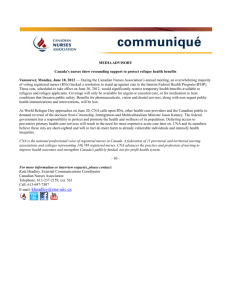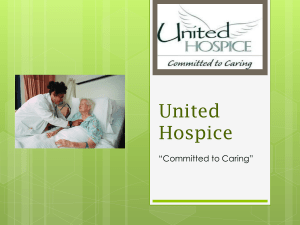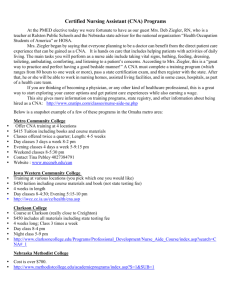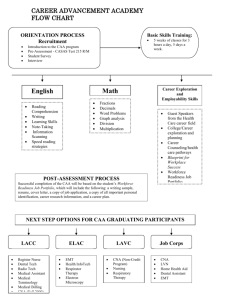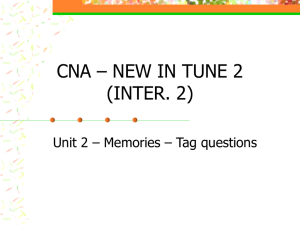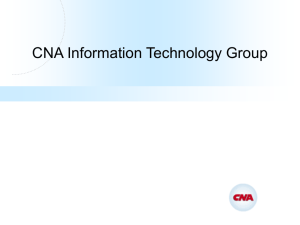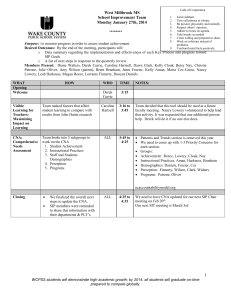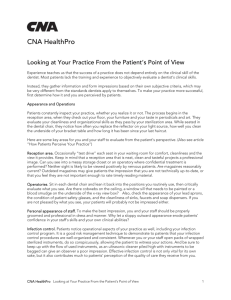Presentation - Canadian Public Health Association
advertisement
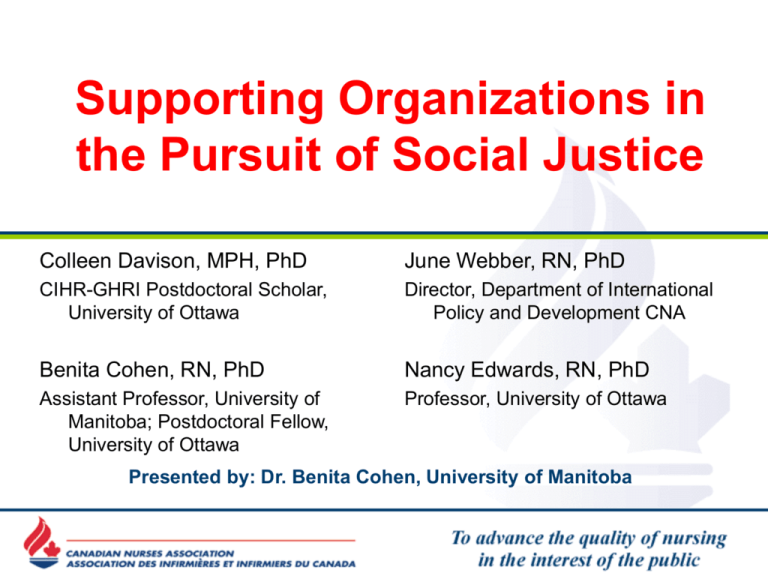
Supporting Organizations in the Pursuit of Social Justice Colleen Davison, MPH, PhD June Webber, RN, PhD CIHR-GHRI Postdoctoral Scholar, University of Ottawa Director, Department of International Policy and Development CNA Benita Cohen, RN, PhD Nancy Edwards, RN, PhD Assistant Professor, University of Manitoba; Postdoctoral Fellow, University of Ottawa Professor, University of Ottawa Presented by: Dr. Benita Cohen, University of Manitoba Social Justice is… • A founding pillar of public health • A critical goal of social progress Aims of the Presentation To provide: • A brief overview of the CNA Social Justice Initiative • An introduction to the current version of the CNA Social Justice Gauge • Links to further information • Inspiration for other organizations to consider the same kind of initiative Social Justice Initiative CNA Board of Directors Signals Interest in, and Commitment to, Social Justice CNA Board of Directors Social Justice Workshop CNA Social Justice Initiative June 2002 June 2003 Phase IA & IB Defining and Monitoring SJ Phase II – CNA Social Justice Gauge Phase III Testing December 2003 – February 2004 March 2004 – March 2005 October 2006 – January 2007 Phase IV – Adapting the Gauge July – November 2007 Phase V - Testing September 2008 Key publications Social Justice is… • “the fair distribution of society’s benefits, responsibilities and their consequences. It focuses on the relative position of one social group in relationship to others in society as well as on the root causes of disparities and what can be done to eliminate them.” (CNA. 2006. Social Justice: A means to an end; an end in itself. p. 4) Social Justice is… Grounded in four key ideas: 1. Fairness; 2. The relative position of individuals and groups in society; 3. An understanding of the root causes of unnecessary disparities, and; 4. Taking action to eliminate these disparities. The Social Justice Ideal is… • That all individuals and social groups are valued and, taking into consideration social context, society’s benefits and responsibilities are distributed in a way that reduces unnecessary disparities [inequities]. Our Guiding Principles • Recognition – The organization must understand and be able to describe inequities that exist, the reasons for their presence and how they affect population sub-groups, including nurses • Responsible action – The organization must take action on inequities, advocate for the reduction of sources of oppression and work towards parity and fairness Social Justice Gauge • A resource tool developed as part of the Social Justice Initiative • A guide for policy and program review and a springboard for reflection and discussion for an organization • Helps focus people’s attention on the key ideals of a social justice perspective. • Now in its second version. Question #1 Does the document/program/policy reflect recognition of the importance of equity/fairness? Examples might include: specific mention of equity or fairness; non-discriminatory content; evidence of the support for universal human rights; or equitable involvement of a diverse set of stakeholders. Question #2 Does the document/program/policy reflect recognition of the relative position of one individual or group to others in society? Examples might include: mention of, or focus on, disadvantaged groups or individuals; or evidence of a lack of capacity or engagement especially among disadvantaged groups. Question #3 Does the document/program/policy reflect an understanding of the root causes of inequities in society, particularly those related to social systems, structures and institutions? Examples might include: work at a system, structural or institutional level to support equity such as the inclusion of equity, fairness or justice in codes of ethical practice or the use of specific institutional tools ensure the fair treatment of all individuals. Question #4 Does the document/program/policy reflect recognition of the necessity of responsible action to reduce and eliminate inequities? Example might include; targeted programming, advocacy aimed at reducing disparities; partnerships between diverse stakeholders; or evidence-based decision-making. Key Publications SOCIAL JUSTICE … a means to an end, an end in itself CNA (2006) http://www.cnaiic.ca/CNA/documents/pdf/publication/Social_Justice_e.pdf Davison, C., Edwards, N., and Webber, J. 2006. Development of a Social Justice Gauge and Its Use to Review the Canadian Nurses Association’s Code of Ethics for Registered Nurses. Advances in Nursing Science. Vol.29. No.4, pp.E13-E26. Edwards, N & Davison, CM (in press) Social Justice and Core Competencies for Public Health: Improving the Fit. Canadian Journal of Public Health. Canadian Nurses Association Department of International Policy and Development 50 Driveway Ottawa ON Canada K2P 1E2 Telephone: 1-800-361-8404 or (613) 237-2133 Fax: (613) 237-3520 E-mail: info@cna-aiic.ca Web site: www.cna-aiic.ca
